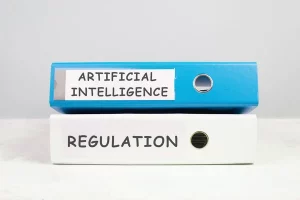In response to the rapid advancement of artificial intelligence (AI) and its impact on society, U.S. senators have introduced two bipartisan bills that aim to address crucial issues surrounding this transformative technology. The proposed legislation reflects growing concerns about transparency, accountability, and maintaining America’s competitive edge. Here’s an overview of the two bills and their potential implications for the future of AI regulation and global leadership.
Also Read: China’s Proposed AI Regulations Shake the Industry

Promoting Transparency in Government AI Use
Senators Gary Peters, Mike Braun, and James Lankford have introduced a bipartisan bill to ensure transparency and accountability in U.S. government agencies’ use of AI technology. The proposed legislation would require agencies to disclose when they utilize AI in interactions with individuals. Additionally, the bill mandates the establishment of an appeals process for individuals to challenge decisions made by AI systems. Placing humans in the driver’s seat shows the bill upholds the principles of fairness & accountability in government AI usage.
Maintaining U.S. Competitiveness in AI
Senators Michael Bennet, Mark Warner, & Todd Young proposed a bipartisan measure to maintain a competitive edge in emerging technologies. The bill aims to establish an Office of Global Competition Analysis dedicated to ensuring that the U.S. remains at the forefront of AI development. This proactive approach seeks to prevent competitors like China from overtaking the U.S. in strategic areas such as semiconductors, quantum computing, & AI. The bill aims to safeguard America’s position as a technological leader by prioritizing investment and innovation.
Also Read: Microsoft Takes the Lead: Urgent Call for AI Rules to Safeguard Our Future
Responding to the Rise of AI
These bills reflects a growing recognition among lawmakers that new regulations are necessary to address the challenges posed by AI. The technology garnered significant attention earlier this year when ChatGPT, an AI program that answers written questions, became widely available. As AI advances, lawmakers realize the need for proactive measures to govern its deployment and mitigate potential risks.
Also Read: Renowned AI Pioneer Thinks Humanity is at Risk Because of AI

Educating Lawmakers on AI
Senate Majority Leader Chuck Schumer has scheduled three briefings on AI to further equip lawmakers with the necessary knowledge & insights. The briefings cover various topics, including a general overview of AI, strategies for achieving American leadership in the field, and a classified session on defense and intelligence implications. By providing comprehensive education and fostering informed decision-making, Congress aims to address AI-related challenges with a solid understanding of the technology and its implications.

Our Say
The introduction of two bipartisan bills in the U.S. Congress demonstrates the increasing recognition of the need to regulate AI and maintain America’s global competitiveness. By emphasizing transparency, accountability, and the establishment of dedicated offices, these bills seek to navigate the complexities of AI effectively. As Congress takes steps to address the rise of AI, it is crucial to strike a balance that promotes innovation while safeguarding the rights and interests of individuals. Through informed policymaking & proactive measures, the United States can lead the way in better harnessing the potential of artificial intelligence.




